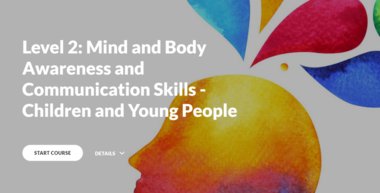New mind and body training to support children and young people
Our new Level 2: Mind and Body Awareness and Communication Skills - Children and Young People, is now available on the King’s Health Partners Learning Hub.
 One in six school-aged children has a mental health condition. 20% of adolescents may experience a mental health condition in any given year. 50% of mental health conditions are established by age 14 and 75% by age 24. Creating a culture and approach where patients, including children and young people, are treated holistic is at the centre the King’s Health Partners Mind & Body programme.
One in six school-aged children has a mental health condition. 20% of adolescents may experience a mental health condition in any given year. 50% of mental health conditions are established by age 14 and 75% by age 24. Creating a culture and approach where patients, including children and young people, are treated holistic is at the centre the King’s Health Partners Mind & Body programme.
One of the ways our Mind & Body programme supports healthcare professionals in providing holistic care is through education and training. The new Level 2: Mind and Body Awareness and Communication Skills - Children and Young People – now available on the Learning Hub - aims to support healthcare professionals in better understanding the mind and body needs of children and young people.
Anto Ingrassia, Consultant Child and Adolescent Psychiatrist at South London and Maudsley NHS Foundation Trust, and creator of the training, explains why mind and body education and training is vital in delivering holistic care for children and young people.
What does mind and body care mean to you and why is it important?
By training I am a mental health professional, but also a doctor. Throughout my career, I have worked in clinical situations that showed it is virtually impossible to effectively care for someone’s physical health, without understanding their psychological and emotional health. I have also worked in environments that have shown it is not vital that we cannot effectively look after someone’s mental health, without understanding their physical health and social circumstances.
The need for holistic care is true for everyone, but it is particularly true for children and young people. For children and young people, their experiences at a young age contribute to their developmental wellbeing.
Whether you are a mental or physical health practitioner, teacher or social worker, it is vital to think about a child’s needs in a comprehensive a way as possible. It is important for you to be aware of the other factors that are affecting the child’s or young person’s life. Ideally, you can work with others who can or are able to help and support the child. For example, if you are a nurse, you know the social worker involved, or the Special Educational Needs Coordinator (SENCo) in school. Working effectively together with others is vital for the holistic care of children and young people.
What role does education and training play in delivering mind and body care?
Education and training play a crucial role throughout our healthcare careers. Training, like the new Level 2: Mind and Body Awareness and Communication Skills - Children and Young People, builds on the training and knowledge we first receive in our healthcare careers. It provides new perspectives, skills and expertise that you may need in order to put mind and body care into practice.
Education and training that focuses on challenges, real life situations and connects us with others can make a real difference to the care you provide.
Please describe the new mind and body training for children and young people
The new training is for practitioners working in health, social care and education. It aims to equip staff working with children, young people and families with the skills to manage the overlap of psychological and physical needs of patients, as well as developing a better understanding of contextual factors that may affect their health outcomes.
We tried to avoid this course being purely didactic by using plenty of real-life scenarios. The course provides good suggestions about skills to use in clinical practice, along with resources for those who want to learn more about mind and body care. It also helps people source their own local mind and body resources. The training is all about giving our staff the tools to open conversations around mind and body care and making connections with others outside their immediate working environment.
What do you think is the relevance, importance and benefit of this training for our staff, students and communities?
The aim of this new training is to support professionals to work better together for the benefit of young people and children in their care. I am hoping that this course is accessible across a range of disciplines, including education, health and social care. I also hope we can gather feedback from different people, from a range of professions, about what they have liked about the training and what they would have liked to see, so that we can continually enhance the course.
Why is mind and body training important from a patient’s perspective?
Life experiences, such as being diagnosed with diabetes or another long-term health condition, can have repercussions on other areas of your life, such as your mental health. Equally, being diagnosed with a mental health condition can have an impact on your physical health. Mind and body training helps you acknowledge both patients’ mental and physical health, which ultimately means patients’ experience better care, because you treat them as a whole person.
Our Mind & Body programme is committed to joining up mental and physical healthcare, training and research to improve health outcomes for our patients and service users. Find out more about the important work we are doing.